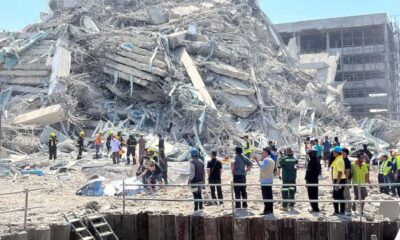World
In reversal, Trump says Russia attacked Ukraine

President Donald Trump reversed course on Friday and said Russia did in fact invade Ukraine, and that Kyiv would soon sign a minerals agreement with the United States as part of efforts to end the Ukraine war.
Trump had said on Tuesday that Ukraine “should have never started” the war three years ago, prompting a wave of criticism both domestically and internationally. Pressed on the subject in an interview with Fox News Radio on Friday, he acknowledged Russia had invaded Ukraine on the order of Russian President Vladimir Putin, Reuters reported.
“Russia attacked, but they shouldn’t have let him attack,” Trump said, adding that Ukraine President Volodymyr Zelenskiy and then-U.S. President Joe Biden should have taken steps to avert the invasion.
Later, Trump predicted a minerals agreement would be reached soon.
“We’re signing an agreement, hopefully in the next fairly short period of time,” Trump told reporters in the Oval Office when asked about a possible deal for Ukraine’s minerals.
Zelenskiy said separately on Friday that Ukrainian and U.S. teams were working on a draft agreement. “I am hoping for … a fair result,” he said in a video address after sharp exchanges this week between the two leaders.
Trump denounced Zelenskiy as a “dictator” on Wednesday and warned he had to move quickly to secure peace with Russia, which invaded Ukraine nearly three years ago, or risk losing his country.
The change in tone from the United States, Ukraine’s most important backer, has alarmed European officials and stoked fears that Kyiv could be forced into a peace deal that favors Putin.
Zelenskiy had said Trump was trapped in a “disinformation bubble”, but later toned down his statements and said he was hoping for American pragmatism.
Zelenskiy on Wednesday rejected U.S. demands for $500 billion in mineral wealth from Ukraine to repay Washington for wartime aid, saying the United States had supplied nowhere near that sum so far and offered no specific security guarantees in the agreement.
Ukraine has valuable deposits of strategic minerals that the U.S. wants. These include uranium, lithium, cobalt, rare earths and more and are used in applications such as batteries, technology and aerospace.
‘THEY DON’T HAVE ANY CARDS’
Speaking at a White House event earlier on Friday, Trump was critical of Zelenskiy while refraining from negative comments about Putin.
“I’ve had very good talks with Putin, and I’ve had not such good talks with Ukraine,” Trump said. “They don’t have any cards, but they’re playing tough.”
Separately, the United States on Friday proposed a United Nations resolution to mark the third anniversary of Russia’s invasion of Ukraine. The three-paragraph U.S. draft, seen by Reuters, mourns loss of life during the “Russia-Ukraine conflict” and “implores a swift end to the conflict.”
Kyiv and its European allies want their own text to be adopted by the UN General Assembly on Monday calling for de-escalation, an early cessation of hostilities and peaceful resolution to the conflict.
The German government said on Friday that Chancellor Olaf Scholz and Zelenskiy agreed in a phone call that Ukraine must have a seat at the table in peace talks.
Polish President Andrzej Duda, meanwhile, urged Zelenskiy to keep up calm and constructive cooperation with Trump.
Duda, whose term in office expires this year, was one of Trump’s preferred international partners during his 2017-2021 presidency and they have described themselves as friends.
Poland’s president is due to meet Trump in Washington on Saturday, Poland’s state news agency PAP reported.
World
Israel kills Hezbollah official in deadly Beirut airstrike

An Israeli airstrike killed four people including a Hezbollah official in Beirut’s southern suburbs on Tuesday, a Lebanese security source said, further testing a shaky ceasefire between Israel and Iran-backed Hezbollah.
The Israeli military said the official – Hassan Bdeir – was a member of a Hezbollah unit and Iran’s Quds Force, and he had assisted the Palestinian group Hamas in planning a “significant and imminent terror attack against Israeli civilians,” Reuters reported.
The Lebanese security source said the target was a Hezbollah figure whose responsibilities included the Palestinian file. The Lebanese health ministry said the strike killed four people – including a woman – and wounded seven others.
It marked Israel’s second airstrike in the Hezbollah-controlled suburb of Beirut in five days, adding to strains on the U.S.-brokered ceasefire that ended last year’s devastating conflict.
The attacks on Beirut’s southern suburbs have resumed at a time of broader escalation in the region, with Israel having restarted Gaza strikes after a two-month truce and the United States hitting the Iran-aligned Houthis of Yemen in a bid to get them to stop attacking Red Sea shipping.
Hezbollah lawmaker Ibrahim Moussawi said the Israeli attack amounted to “a major and severe aggression that has escalated the situation to an entirely different level”.
Speaking in a televised statement after visiting the building that was struck, he called on the Lebanese state to “activate the highest level of diplomacy to find solutions”.
Israeli Foreign Minister Gideon Saar said the eliminated Hezbollah operative posed “a real and immediate threat”. “We expect Lebanon to take action to uproot terrorist organizations acting within its borders against Israel,” he said.
Israel dealt severe blows to Hezbollah in the war, killing thousands of its fighters, destroying much of it arsenal and eliminating its top leadership including Hassan Nasrallah.
Hezbollah has denied any role in recent rocket attacks from Lebanon towards Israel, including one that prompted Israel to carry out an airstrike on the southern suburbs last Friday.
Tuesday’s strike in the early hours appeared to have damaged the upper three floors of a building, a Reuters reporter at the scene said, with the balconies of those floors blown out.
The glass on the floors below was intact, indicating a targeted strike. Ambulances were at the scene as families fled to other parts of Beirut.
There was no advance warning, in contrast to the attack on Friday when the Israeli military announced which building it intended to hit and ordered residents to leave the area.
Lebanese President Joseph Aoun condemned the latest airstrike, calling it a “dangerous warning” that signals premeditated intentions against Lebanon, which would intensify diplomatic outreach and mobilise international allies.
Lebanese Prime Minister Nawaf Salam said the strike was a flagrant breach of a U.N. Security Council Resolution upon which the ceasefire was based, and the ceasefire arrangement.
U.S. BACKS ISRAEL
The ceasefire agreement demanded that southern Lebanon be free of Hezbollah fighters and weapons, that Lebanese troops deploy into the area, and that Israeli troops withdraw.
But each side accuses the other of failing to implement the terms fully. Israel says Hezbollah still has infrastructure in the south, while Lebanon and Hezbollah say Israel is occupying Lebanese soil by not withdrawing from five hilltop positions.
The U.S. State Department said that Israel was defending itself from rocket attacks that came from Lebanon and that Washington blamed “terrorists” for the resumption of hostilities.
“Hostilities have resumed because terrorists launched rockets into Israel from Lebanon,” a State Department spokesperson said in an email, responding to a question from Reuters seeking reaction to Tuesday’s airstrike. Washington supported Israel’s response, the spokesperson said.
The Israel-Hezbollah conflict was ignited when Hezbollah opened fire in support of Hamas at the start of the Gaza war. It escalated in September when Israel went on the offensive, declaring the aim of securing the return home of tens of thousands of people evacuated from homes in the north.
The war uprooted more than a million people and killed at least 3,768 people in Lebanon, according to a Lebanese health ministry toll from November. Dozens more have been reported killed by Israeli fire since the ceasefire.
Lebanon’s figures do not distinguish between civilians and fighters.
During the war, Hezbollah strikes killed 45 civilians in northern Israel and the Israeli-occupied Golan Heights. At least 73 Israeli soldiers were killed in northern Israel, the Golan Heights, and in combat in southern Lebanon, according to Israeli authorities.
World
Trump says Zelenskiy wants to back out of critical minerals deal

U.S. President Donald Trump said on Sunday Ukrainian President Volodymyr Zelenskiy wants to back out of a critical minerals deal, warning the Ukrainian leader would face big problems if he did.
“He’s trying to back out of the rare earth deal and if he does that he’s got some problems, big, big problems,” Trump told reporters.
“He wants to be a member of NATO, but he’s never going to be a member of NATO. He understands that.”
(Reuters)
World
South Korea, China, Japan seek regional trade amid Trump tariffs

South Korea, China and Japan held their first economic dialogue in five years on Sunday, seeking to facilitate regional trade as the three Asian export powers brace from U.S. President Donald Trump’s tariffs.
The countries’ three trade ministers agreed to “closely cooperate for a comprehensive and high-level” talks on a South Korea-Japan-China free trade agreement deal to promote “regional and global trade”, according to a statement released after the meeting.
“It is necessary to strengthen the implementation of RCEP, in which all three countries have participated, and to create a framework for expanding trade cooperation among the three countries through Korea-China-Japan FTA negotiations,” said South Korean Trade Minister Ahn Duk-geun, referring to the Regional Comprehensive Economic Partnership.
The ministers met ahead of Trump’s announcement on Wednesday of more tariffs in what he calls “liberation day”, as he upends Washington’s trading partnerships.
Seoul, Beijing and Tokyo are major U.S. major trading partners, although they have been at loggerheads among themselves over issues including territorial disputes and Japan’s release of wastewater from the wrecked Fukushima nuclear power plant.
They have not made substantial progress on a trilateral free-trade deal since starting talks in 2012.
RCEP, which went into force in 2022, is a trade framework among 15 Asia-Pacific countries aimed at lowering trade barriers.
Trump announced 25% import tariffs on cars and auto parts last week, a move that may hurt companies, especially Asian automakers, which are among the largest vehicle exporters to the U.S.
After Mexico, South Korea is the world’s largest exporter of vehicles to the United States, followed by Japan, according to data from S&P.
The ministers agreed to hold their next ministerial meeting in Japan.
(Reuters)
-

 Business5 days ago
Business5 days ago36 mining contracts inked over the past year: Mines ministry
-

 Latest News4 days ago
Latest News4 days agoDried fruit market in Herat booms ahead of Eid-al-Fitr
-

 Regional5 days ago
Regional5 days agoPowerful quake in Southeast Asia kills several, Myanmar declares state of emergency
-

 Latest News5 days ago
Latest News5 days agoUS may ask for military equipment left behind in Afghanistan: Trump
-

 International Sports5 days ago
International Sports5 days agoLucknow’s six-hitting machine Pooran justifies top order slot
-

 Latest News4 days ago
Latest News4 days agoMore than 70,000 Afghans returned home in third week of March: IOM
-

 Health4 days ago
Health4 days agoGlobal organizations warn of health crisis due to aid cuts in Afghanistan
-

 Latest News5 days ago
Latest News5 days agoNegotiations with Afghanistan are the only way forward: Pakistan’s ex-PM Khan
























